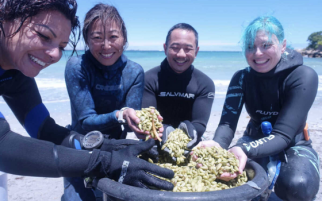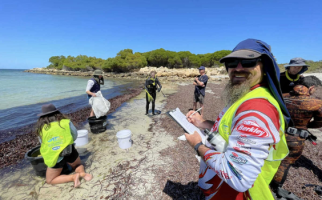Recfishwest is encouraging metro fishers to get involved and back in Ozfish’s latest Seeds for Snapper drive – its program to help restore critical seagrass habitat in Cockburn Sound.
Since 2018, Recfishwest has collaborated with OzFish and the University of Western Australia to restore seagrass meadows in Cockburn Sound, which are vital as a nursery ground for countless fish and species of marine life including pink snapper, King George whiting, herring, Western rock lobster, prawns, squid and blue swimmer crabs.
Now in it’s fifth year, Seeds for Snapper has already helped collect more than one million seeds in Cockburn Sound, but as volunteers are the driving force behind this project, Recfishwest is encouraging everyone to dig deep and help out by collecting the seeds or dispersing them.

Watch OzFish’s video highlighting the importance of Cockburn Sound’s seagrass meadows here
The Seeds for Snapper program relies on community support from recreational anglers, divers, businesses and residents to help disperse the seeds, which are the key to helping rejuvenate juvenile fish habitats.
It is estimated that a single hectare of restored seagrass produces on average 207 kilograms of fish per year and stores 35 times more carbon than the same equivalent area of rainforest.
Over the last century, 85 per cent of these crucial seagrass meadows – equivalent to nearly 2,000 Optus Stadium-sized ovals – have been lost in Cockburn Sound.
With the Government recently proposing a shock eight to nine-month west coast demersal species ban per year and with the Government’s plans to build a new port in Cockburn Sound starting in 2027, the Seeds for Snapper program underpins why preserving the sustainability of these seagrass meadows is more important than ever.
“Cockburn Sounds seagrass meadows act as a nursery area for important species such as crabs, snapper, squid, whiting and garfish and supports the only known spawning aggregations of pink snapper in the West Coast Bioregion, said Recfishwest CEO Dr Andrew Rowland.
“Merely maintaining the status quo is not an option after the huge loss of seagrass habitat in the Sound over the years. It is vital, therefore, that initiatives like this are supported and boosted to help improve the environmental state of Cockburn Sound.
“The Sound’s protected waters on the doorstep of our capital city offer great land and boat-based fishing for fishers of all ages and abilities and fishers can play their part to by helping collect and disperse seagrass seeds and breathe more life into these vital nursery grounds.”

There were more than 350 registered volunteers dedicating their time last year with the Seeds for Snapper program through a variety of roles, including as boat-based netters, qualified scuba and free divers, shore crews and as seagrass seed dispersal units.
The seagrass fruit harvesting and seed dispersal season will take place from November. Collection and dispersal days and times are subject to weather and tides, so if you want to take part in the fifth year of this great program, Recfishwest encourages volunteers to dig deep and register through the link below.
Sign up as a Seeds for Snapper 2022 volunteer here!
The Seeds for Snapper program is funded by the Recreational Fishing Initiatives Fund (RFIF) using your licence fees and is made possible by Recfishwest, OzFish, the University of Western Australia, the WA Government’s Recreational Fishing Initiative Fund, Water Corporation and BCF – Boating, Camping, Fishing.